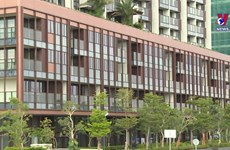Economic activities fail to enliven stock market
Shares were mixed last week on both bourses with a weak cash flow and
cautious investors, but some data hinted at economic recovery.
Shares were mixed last week on both bourses with a weak cash flow and
cautious investors, but some data hinted at economic recovery.
On the Ho Chi Minh City Stock Exchange, the VN-Index lost 0.7 percent over the November 1 session close to end at 497.08 points. The average trading volume reached 962.3 billion VND (45.3 million USD), accounting for only 78.3 percent of the preceding week's level. Trading volume averaged 53.17 million shares per session.
On the Hanoi Stock Exchange, the HNX-Index increased 0.4 percent to 62.08 points. The average value of trades was only around 200 billion VND (9.4 million USD), declining by 33.5 percent.
Foreign investors continued to be buyers last week, totalling a margin of 83.6 billion VND (3.9 million USD), following last month's trend when their net buying value hit nearly 1.2 trillion VND (56.6 million USD).
The October 28 session was hit by sell-offs on both blue chips and speculative stocks. The market rallied during some following sessions but trading remained sluggish.
Transactions on speculative stocks were strongly differentiated. Some were sold heavily, such as financial firm Ocean Group (OGC), Thanh Cong Textile and Garment Investment (TCM), Vietnam Petroleum Transport (VIP) and property developers Hoang Quan (HQC), FLC (FLC) and Licogi 16 (LCG).
Meanwhile, several others enjoyed gains, including Vietnam Electricity Construction (VNE), Tien Len Steel Corp (TLH) and property developers An Duong Thao Dien (HAR), Tu Liem Urban Development (NTL) and Development Investment Construction (DIG).
Liquidity declined throughout the week, also caused by a cautious appetite.
However, there was some positive news signalling that the economy was getting brighter.
The Vietnam Asset Management Company (VAMC) is said to buy 30-35 trillion VND (1.4-1.6 billion USD) of non-performing loans (NPLs) this year and 100-150 trillion VND (4.7-7 billion USD) next year.
As of October, VAMC has bought over 11 trillion VND (518.8 million USD) NPLs from 14 banks, while there were 20 lenders filing for offloads.
The State Bank of Vietnam governor Nguyen Van Binh said in a meeting on November 1 that the banking system's bad debts could have reached 10 percent if the VAMC did not operate.
In addition, analysts forecast that the consumer price index in November will rise only 0.5-0.6 percent compared to the previous month, while Vietcombank expects this year's inflation to be curbed at under 7 percent.
HSBC announced on November 2 that the Vietnam Purchasing Managers' Index (PMI) for October retained its record high of 51.5 points achieved in September.
"The continued expansion signalled by the PMI shows that activity is indeed stabilising in the country," commented the bank's Asia economist Trinh Nguyen.
She expected economic activity to continue to be bolstered by strong performance of exports, supported by steady FDI inflows. "This will help Vietnam get through a tough deleveraging phase, with foreign inflows counterbalancing sluggish domestic demand," she explained.
Still, the stock market needed more bold economic policies during the last two months of the year, said FPT Securities Co analyst Nguyen Van Quy.-VNA
On the Ho Chi Minh City Stock Exchange, the VN-Index lost 0.7 percent over the November 1 session close to end at 497.08 points. The average trading volume reached 962.3 billion VND (45.3 million USD), accounting for only 78.3 percent of the preceding week's level. Trading volume averaged 53.17 million shares per session.
On the Hanoi Stock Exchange, the HNX-Index increased 0.4 percent to 62.08 points. The average value of trades was only around 200 billion VND (9.4 million USD), declining by 33.5 percent.
Foreign investors continued to be buyers last week, totalling a margin of 83.6 billion VND (3.9 million USD), following last month's trend when their net buying value hit nearly 1.2 trillion VND (56.6 million USD).
The October 28 session was hit by sell-offs on both blue chips and speculative stocks. The market rallied during some following sessions but trading remained sluggish.
Transactions on speculative stocks were strongly differentiated. Some were sold heavily, such as financial firm Ocean Group (OGC), Thanh Cong Textile and Garment Investment (TCM), Vietnam Petroleum Transport (VIP) and property developers Hoang Quan (HQC), FLC (FLC) and Licogi 16 (LCG).
Meanwhile, several others enjoyed gains, including Vietnam Electricity Construction (VNE), Tien Len Steel Corp (TLH) and property developers An Duong Thao Dien (HAR), Tu Liem Urban Development (NTL) and Development Investment Construction (DIG).
Liquidity declined throughout the week, also caused by a cautious appetite.
However, there was some positive news signalling that the economy was getting brighter.
The Vietnam Asset Management Company (VAMC) is said to buy 30-35 trillion VND (1.4-1.6 billion USD) of non-performing loans (NPLs) this year and 100-150 trillion VND (4.7-7 billion USD) next year.
As of October, VAMC has bought over 11 trillion VND (518.8 million USD) NPLs from 14 banks, while there were 20 lenders filing for offloads.
The State Bank of Vietnam governor Nguyen Van Binh said in a meeting on November 1 that the banking system's bad debts could have reached 10 percent if the VAMC did not operate.
In addition, analysts forecast that the consumer price index in November will rise only 0.5-0.6 percent compared to the previous month, while Vietcombank expects this year's inflation to be curbed at under 7 percent.
HSBC announced on November 2 that the Vietnam Purchasing Managers' Index (PMI) for October retained its record high of 51.5 points achieved in September.
"The continued expansion signalled by the PMI shows that activity is indeed stabilising in the country," commented the bank's Asia economist Trinh Nguyen.
She expected economic activity to continue to be bolstered by strong performance of exports, supported by steady FDI inflows. "This will help Vietnam get through a tough deleveraging phase, with foreign inflows counterbalancing sluggish domestic demand," she explained.
Still, the stock market needed more bold economic policies during the last two months of the year, said FPT Securities Co analyst Nguyen Van Quy.-VNA













